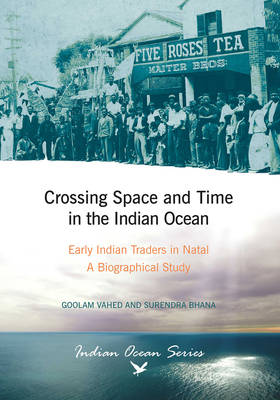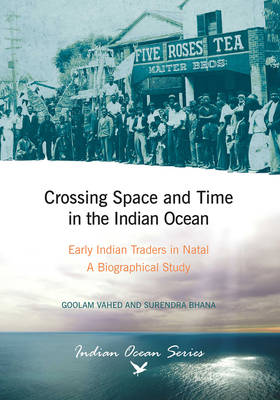
- Afhalen na 1 uur in een winkel met voorraad
- Gratis thuislevering in België vanaf € 30
- Ruim aanbod met 7 miljoen producten
- Afhalen na 1 uur in een winkel met voorraad
- Gratis thuislevering in België vanaf € 30
- Ruim aanbod met 7 miljoen producten
Zoeken
Crossing Space and Time in the Indian Ocean
Early Indian Traders in Natal. a Biographical Study
Goolam Vahed, Surendra Bhana
€ 42,95
+ 85 punten
Omschrijving
This book examines the interregional movement of capital and labour in the Indian Ocean where Indians settled and traded in Natal in the late 19th and early 20th centuries. It traces the origins, migration, and settlement of some 200 of Natal's Indian traders from India, Mauritius, and East and southern Africa in what has been described as the 'Asian bazaar economy', and 'connected histories' that range beyond Natal's borders. The study's main focus, however, is on a cross-section of Natal's Hindu, Muslim, Parsi, and Christian traders. Some established well-capitalised businesses, but most engaged in small trades to facilitate the distribution of goods throughout the colony in service of Indian, African and White clientele. All of them, small and large, contributed substantially to the growth of Natal's economy. In the first part of the book, the authors provide a detailed historical context in which migration occurred, weaving together the local, regional, and the transnational. The second part consists of biographical 'micro-histories' that go beyond the conventional Who's Who, since they are based on rich archival sources, the deceased estates of the Master of the Supreme Court, court records, obituaries, newspaper accounts, and interviews. The study offers new insights into Natal's early Indian traders, whose personal and communal histories additionally reflect their lived experiences as they set roots in South Africa. (Series: Indian Ocean) [Subject: History, Migration, South Asian Studies, African Studies]
Specificaties
Betrokkenen
- Auteur(s):
- Uitgeverij:
Inhoud
- Aantal bladzijden:
- 288
- Taal:
- Engels
- Reeks:
Eigenschappen
- Productcode (EAN):
- 9781868887798
- Verschijningsdatum:
- 1/10/2015
- Uitvoering:
- Paperback
- Formaat:
- Trade paperback (VS)
- Afmetingen:
- 168 mm x 239 mm
- Gewicht:
- 616 g

Alleen bij Standaard Boekhandel
+ 85 punten op je klantenkaart van Standaard Boekhandel
Beoordelingen
We publiceren alleen reviews die voldoen aan de voorwaarden voor reviews. Bekijk onze voorwaarden voor reviews.











